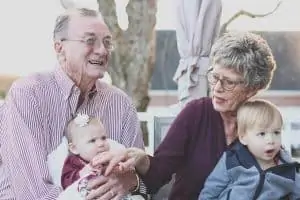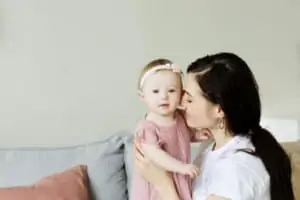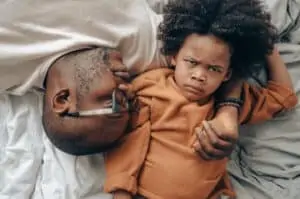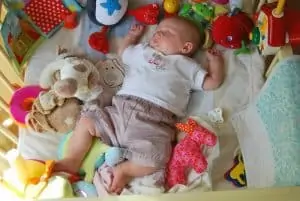Gibberish is a word that makes my children laugh. That’s because my husband one day informed our eldest that whatever she told him was absolute gibberish. But as he said this, he belched. So, gibberish is a silly thing in our home.
Also, my girls are bigger now.
But when they were little, I remember my eldest trying to say, “SpongeBob.” It came out like “Fa-fa.” That’s when I realized I could understand her, but probably no one else could.
And it brought me back to my days pre-kids when I felt weird being around little ones. I wondered how in the world they could understand when their toddler was speaking gibberish. It turns out; that toddler gibberish language is pretty common though you won’t get it until you become a mom of a 3-year-old that speaks gibberish.
You may also be wondering why your 2-year-old babbles but doesn’t talk. This toddler gibberish language age is tricky but lucky for you, and you’ve got me to walk you through it. Let’s dive in!
Is it normal for toddlers to talk in gibberish?
I hate the term “normal” for many reasons, and this case is one of them. Yes, it’s ‘normal’ to hear that gibberish and babbling at random. But there are times when it should concern you.
For most parents of a toddler talking gibberish, it may start with babbling but become something that sounds like another language. They inflect their voice and use hand gestures. They may even hope you’ll respond. But it’s ok if you don’t understand. What matters is that it makes sense to your child.
But even still, 3-year-old talking nonsense is concerning because they should be able to communicate their needs. So, why is this happening?
Reasons why your 3-year-old is talking nonsense
As I mentioned, there are many reasons why your toddler is speaking gibberish. Let’s discuss it!
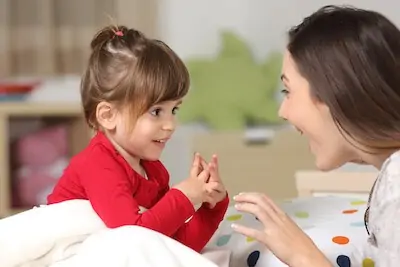
They were born preemie
This toddler gibberish situation is more common for preemies. That makes sense since they’re a bit behind in development. If your child was born prematurely, you may find comfort in knowing they should catch up to where they should be soon.
Not enough stimulation or encouragement
When my girls were babies, I felt like a narrator, constantly telling them what was going on. My breastfeeding coach, Vivien, had told me this was super-important, so I had a running monologue each day. I also fussed over every babble they made as babies to encourage them.
Take a look at what you’re doing and see if you’re inviting more conversation. It’s never too late to start that monologue!
Intellectual disabilities
Intellectual disabilities are more concerning, of course. This will become a part of testing at your pediatrician’s office. Children with these disabilities may speak gibberish or have speech delays. Likely, you’ve noted other unusual behavior with your doctor, who can help guide you through this.
Or autism
Yes, babies diagnosed with autism will likely have language problems and not speak clearly.
Brain injury
My biggest fear as a new mom was what if I dropped my baby. I worried about brain injuries because those little heads aren’t completely solid yet. But babies are mostly resilient. Of course, I don’t recommend dropping your child, but it takes a severe impact to cause neurological problems.
Regular checkups with your doctor will ensure that you detect a brain injury quickly. If your child has been in a traumatic accident with brain injury, it could cause language and speech delays.
Hearing troubles
By your child’s toddler years, they should get regular hearing tests during their checkups. If your doctor notes your baby has trouble hearing, they may be more prone to speaking gibberish.
Another thing could be? Einstein syndrome.
What is Einstein Syndrome?

Einstein syndrome is when a child is late on language skills but gifted in other areas. Named after Einstein himself but coined by Thomas Sowell, this condition means your child will eventually speak without a problem and is brilliant in other areas.
Just because your child is a late-talker doesn’t mean they have autism or other developmental conditions, as discussed above. If your child is excelling in other areas and is above average in them, you may want to have them evaluated for this.
Should 3-year-olds be able to talk properly?
For the most part, yes, but there are some exceptions that we’ve gone over as to why this could be happening. It’s important to remember that when your 3-year-old speaks gibberish, it may be perfectly normal for your child. Every child is different, and your pediatrician can help you spot anything abnormal.
In general, though, Stanford Children’s Health cites the following as common milestones for the 3-year-old age bracket:
- Speaks anywhere from 500 to 900 words
- Can be understood by others when speaking
- Makes sentences that are 2 to 3 words long
- Capable of expanding to 4 to 5-word sentences
- Remembers simple lyrics or rhymes
- Can say “please” and “thank you”
- Knows how to say their own name
- Able to name the colors
Again, if you’re concerned that your 3-year-old isn’t hitting these milestones, make an appointment with your pediatrician to see if something else is happening.
How to help when your toddler is speaking gibberish
Depending on what your doctor finds, you can do a few things to help your toddler move on from the gibberish phase.
- Seek out speech therapy
Your pediatrician will tell you if they think this is necessary. If it is, a speech therapist for children can help your child start speaking clearly.
- Read up
I read to both of my children before they were even born. And if you didn’t, that’s ok! It’s never too late to pull up a chair, put your little one in your lap, and start reading to them. Showing them colorful books with large words can help them too. The more you read, the more they soak up.
- Try some toys and games
With 2-year-olds talking gibberish and 3-year-olds, games with letter sounds and recognition can help. Simple first words and board books can make these things fun for your child and help them accomplish more in leaps and bounds. This LeapFrog book is the perfect example!
- Narrate your life constantly
When I first had my eldest, all the baby books I read and Vivien too told me to keep talking to the baby. It was weird because, of course, everything is weird when you have a baby. But after a week of feeling like I was just talking to myself, it felt normal.
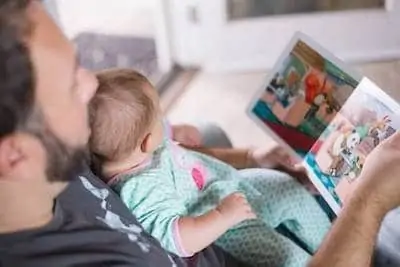
And it does so much for their development. They pick up words and start to understand. They’re also comforted by your voice. While you can’t spoil a baby by holding her all the time, they start calming down when you narrate life as they sit in a baby chair watching you do chores. It builds routine and language, something that’s very good for little ones.
You can and should keep it up as language comes into play for your 2-year-old or 3-year-old gibberish talker.
- Sing it out
Singing works in much the same way. I always liked making up songs growing up. You don’t need a guitar like me or a good voice. Your child will be delighted either way!
Why does my 3-year-old talk like a baby?
Sometimes, it has nothing to do with development. Sometimes, your 2-year-old babbles but doesn’t talk, and your 3-year-old speaks their own language. This can happen in preschool or grade school too.
Why? Kids can regress for different reasons, and it’s most likely a phase. You need to curb the habit, though, so it doesn’t become a huge problem.
What can you do to stop baby talk?
For starters, you’ll want to rule out any serious problems. Usually, this baby babble might come from having a new sibling join the family. Children tend to revert to baby talk because they miss being the baby.
Baby talk and regressive behaviors like bedwetting mean something more serious is going on. If something traumatic has happened, you must schedule an appointment with the pediatrician to help your child properly.
But if your child seems jealous of something and is otherwise doing fine, you may want to downplay the baby talk. Don’t bring it up when it’s not happening, and don’t let them hear you complain about that baby talk. You need to stay calm and not show it bugs you.
I can tell you that even older children will continue to do something if it bothers you. My eldest was talking in a silly voice during a board game the other night, and I was about to go crazy. But if I showed her it bothered me, I knew she’d keep doing it. So I ignored her, and guess what? She started talking normally.
You can also try a subtle way to get them back on track. When your preschool-aged child asks you something in that baby voice, pretend you can’t hear her. When she uses her normal voice, ensure you pay full attention and respond.
For other kids, baby talk can become a habit they don’t notice. Simply asking them to use their ‘big kid voice’ can help. You can also tell them you don’t understand them and use that big kid voice to ask for what they need.
Note that…
Kids in grade school may be doing it because they have anxiety. They may need some extra love and support and feel unsure how to ask for it. Make it a habit to regularly check in with your child about school and how they feel.
Make a big deal about good behavior, though. Just as always, you want a repeat performance for good talking. When your child stops using that baby voice and uses their normal voice, let them know how much you like it and how happy you are to help them with something when they use their big kid voice.
Remember, children want a response. They will continue if their behavior is wrong and you keep responding. So, ignoring the undesirable behavior and then praising the good behavior will quickly help toddlers and school-aged children respond properly and halt the baby babble.
Of course, if you have concerns about your child’s development and they’re behind on other milestones, it’s definitely a conversation you’ve got to have with your pediatrician. Doing so will give your child the best start in life and help them speak clearly, confidently, and proudly all their life!
Leslie Berry lives with her husband and two young daughters in Los Altos, California, where she loves helping other moms get comfortable with motherhood and embracing the insanity with facts peppered with laughs.
She loves eating too much sushi, exercising, and jamming out on her Fender. Read more about Leslie here.

